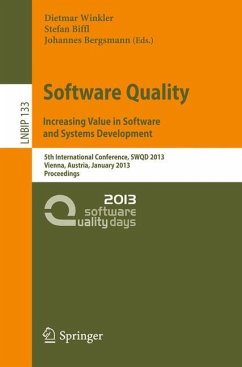
Managing Software Engineering Knowledge
Versandkostenfrei!
Versandfertig in 1-2 Wochen
77,99 €
inkl. MwSt.

PAYBACK Punkte
39 °P sammeln!
Software development is a complex problem-solving activity with a high level of uncertainty. There are many technical challenges concerning scheduling, cost estimation, reliability, performance, etc, which are further aggravated by weaknesses such as changing requirements, team dynamics, and high staff turnover. Thus the management of knowledge and experience is a key means of systematic software development and process improvement. "Managing Software Engineering Knowledge" illustrates several theoretical examples of this vision and solutions applied to industrial practice. It is structured in...
Software development is a complex problem-solving activity with a high level of uncertainty. There are many technical challenges concerning scheduling, cost estimation, reliability, performance, etc, which are further aggravated by weaknesses such as changing requirements, team dynamics, and high staff turnover. Thus the management of knowledge and experience is a key means of systematic software development and process improvement. "Managing Software Engineering Knowledge" illustrates several theoretical examples of this vision and solutions applied to industrial practice. It is structured in four parts addressing the motives for knowledge management, the concepts and models used in knowledge management for software engineering, their application to software engineering, and practical guidelines for managing software engineering knowledge.
This book provides a comprehensive overview of the state of the art and best practice in knowledge management applied to software engineering. While researchers and graduate students will benefit from the interdisciplinary approach leading to basic frameworks and methodologies, professional software developers and project managers will also profit from industrial experience reports and practical guidelines.
This book provides a comprehensive overview of the state of the art and best practice in knowledge management applied to software engineering. While researchers and graduate students will benefit from the interdisciplinary approach leading to basic frameworks and methodologies, professional software developers and project managers will also profit from industrial experience reports and practical guidelines.














